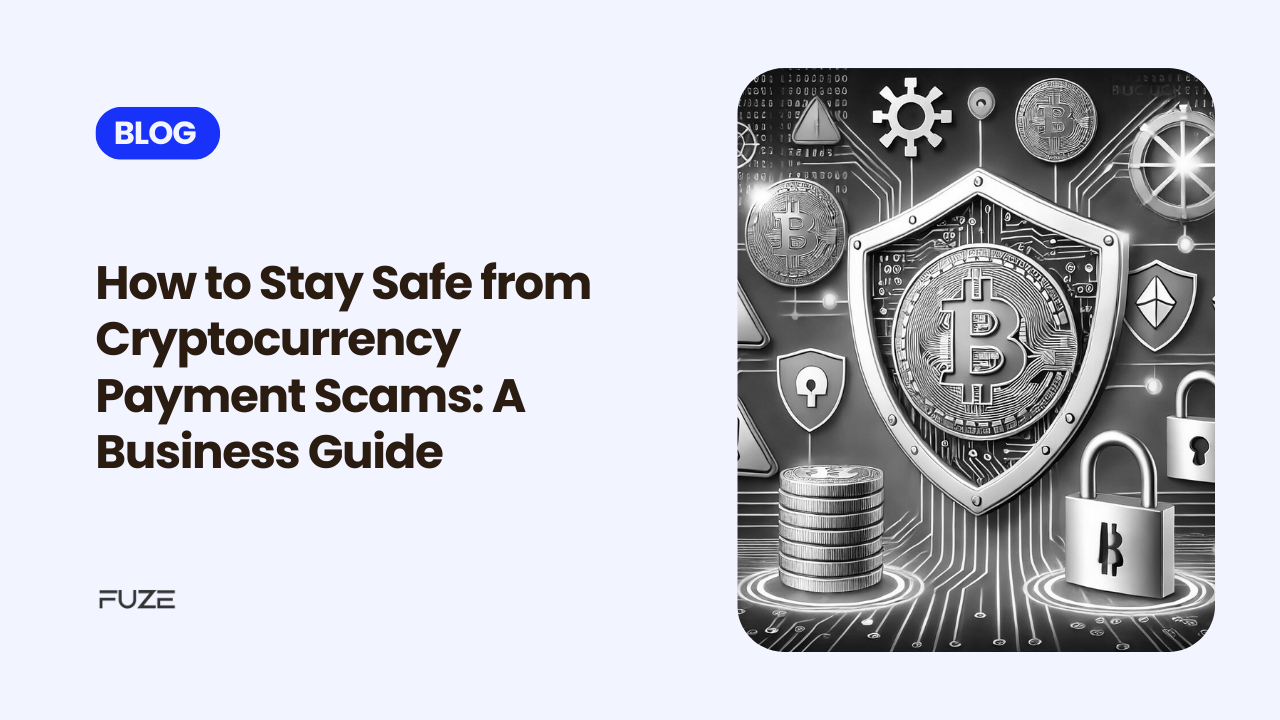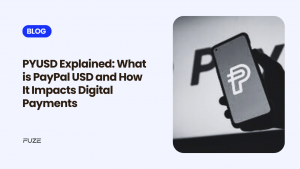The rise of cryptocurrency has introduced transformative opportunities in the business world, especially in payment processing. However, along with these benefits, the rapid growth of crypto has also opened the door to new types of fraud. Today, cryptocurrency payment scams are more sophisticated than ever, targeting businesses of all sizes—from large enterprises to small startups. For companies incorporating crypto into their payment systems, understanding the associated risks and implementing strong security measures is crucial.
In this blog, we’ll explore common cryptocurrency payment scams, key warning signs, and essential preventive measures to protect your business. We’ll also highlight how Fuze’s secure payment solutions can help safeguard your transactions, enabling you to embrace digital payments with confidence.
Common Types of Cryptocurrency Payment Scams
Cryptocurrency payment scams can take many forms, each posing unique risks. Here are some of the most common types of scams that businesses should be vigilant about:
- Phishing Scams: Phishing attacks occur when a scammer impersonates a legitimate entity—such as a known vendor or service provider—and tricks the recipient into providing sensitive information, like login credentials. This information can then be used to access the company’s crypto wallets or financial accounts. Phishing scams often occur via email or fake websites that look legitimate, making it essential to verify the sender’s identity.
- Ponzi and Pyramid Schemes: In a Ponzi or pyramid scheme, scammers lure businesses with promises of high returns on cryptocurrency investments. These schemes initially pay returns to early investors using the funds of newer investors. Over time, these schemes collapse, leaving late investors with significant losses. Businesses should be cautious of unsolicited investment offers with promises of unusually high returns.
- Impersonation Scams: Fraudsters often impersonate vendors, suppliers, or service providers, attempting to deceive businesses into sending crypto payments to a fraudulent address. These scams frequently rely on social engineering tactics, where scammers research their targets to gather information that can help make their approach seem credible.
- Fake ICOs (Initial Coin Offerings): ICOs are a popular way for crypto startups to raise capital, but scammers sometimes create fake ICOs to defraud businesses. They advertise non-existent projects and collect funds from investors, promising returns or equity in the future company. Always research any ICO and verify its legitimacy before committing funds.
- Ransomware Attacks: Ransomware is malware that cybercriminals use to lock a business out of its own systems, demanding a cryptocurrency ransom to restore access. These attacks can disrupt operations and, if not managed carefully, lead to major financial losses.
Understanding these scams is the first line of defence. The more familiar your business is with these schemes, the better you can protect against them.
Warning Signs of Crypto Payment Scams
Spotting cryptocurrency payment scams requires vigilance and a trained eye. Here are common red flags that indicate a potential scam:
- Unexpected Payment Requests: Be cautious of unexpected requests for cryptocurrency payments, particularly from new contacts or unfamiliar addresses. If someone reaches out with a payment demand that wasn’t discussed beforehand, verify their identity through official channels.
- Pressure to Act Quickly: Scammers often try to create a sense of urgency, urging the recipient to “act now” to avoid missing out on an opportunity. They hope this pressure will lead to rushed decisions. Always take time to review requests, even if they seem urgent.
- Unfamiliar Wallet Addresses: Pay close attention to wallet addresses, as scammers may use addresses that look similar to legitimate ones. Before sending funds, confirm the wallet address directly with your contact. Even a single incorrect character could redirect funds to a fraudulent address.
- Promises of High Returns: Any offer that sounds too good to be true likely is. Avoid any investment or partnership promising unusually high returns in a short period, as these promises often signal fraudulent schemes.
- Unusual Communication Channels: Official business communications typically occur through email or secure platforms. Be cautious if you receive payment requests through social media, messaging apps, or other non-traditional channels. Stick to verified communication methods.
Keeping these warning signs in mind can help your team stay alert and avoid falling victim to scams.
How to Identify and Prevent Fraudulent Crypto Transactions
Preventing cryptocurrency payment scams requires a combination of vigilance and secure processes. Implement these measures to protect your business from fraudulent transactions:
- Multi-Step Verification: For high-value transactions, require multi-step verification to confirm payment requests. For example, you might verify payment requests through a secondary communication channel and obtain approval from senior management before processing large transactions.
- Double-Check Wallet Addresses: Before making a payment, verify the recipient’s wallet address directly with the individual or business you’re transacting with. Implement policies that require revalidation of saved wallet addresses every few months to ensure they remain secure and haven’t been altered.
- Conduct Security Audits: Regular security audits by trusted third parties can help identify vulnerabilities in your payment processes and wallet security. Proactively addressing these weaknesses can prevent fraudsters from exploiting them.
- Employee Training: Educate employees on the types of cryptocurrency payment scams and how to identify them. Awareness is a powerful tool, as many scams rely on the target’s unfamiliarity with fraud tactics. Regular training sessions can help keep security protocols fresh in employees’ minds.
- Limit Access to Wallets: Not all employees need access to company crypto funds. Use role-based permissions to restrict access, allowing only essential personnel to make or authorise payments.
By adhering to these practices, businesses can minimise exposure to cryptocurrency payment scams and secure their transactions more effectively.
Securing Your Business with Fuze’s Crypto Payment Solutions
Fuze offers a comprehensive solution for businesses looking to manage cryptocurrency payments securely. Fuze’s platform is designed to address the unique security needs of businesses using digital assets, offering tools and technologies necessary for adequate security.
With Fuze, businesses can access secure, reliable cryptocurrency payment processing that reduces the risks associated with digital payments. The platform provides seamless integration into existing business workflows, enabling businesses to implement cryptocurrency payments without compromising security.
Conclusion
As cryptocurrency adoption continues to grow, so too does the need for businesses to protect themselves from cryptocurrency payment scams. By understanding common scams, recognizing warning signs, and implementing strict security protocols, businesses can operate safely in the digital payment landscape. Fuze’s advanced security measures offer an added layer of protection, empowering companies to handle cryptocurrency payments confidently.
With Fuze as a trusted partner, businesses can take full advantage of digital assets without compromising security. Protect your business with Fuze’s secure, reliable, and innovative crypto payment solutions, and ensure that your digital transactions are both safe and profitable.
Disclaimer: Virtual assets carry significant risks, including high volatility and potential loss of your entire investment. They are not backed by governmental protections, and recourse may be limited in case of loss. Always assess your risk tolerance, fully understand the risks, and seek independent financial advice if needed before investing.
Frequently Asked Questions
1. How can I verify that a cryptocurrency payment is legitimate?
Always confirm the sender’s identity and verify the payment through trusted channels, such as confirming wallet addresses, checking for proper transaction histories, and using escrow services when necessary.
2. What is the best way to recover funds if my business falls victim to a cryptocurrency scam?
Unfortunately, cryptocurrency transactions are irreversible, and recovery of stolen funds is extremely difficult. However, businesses should immediately report the scam to law enforcement, notify their crypto exchange (if applicable), and seek the help of cybersecurity experts to prevent further losses.
3. How does phishing work in cryptocurrency scams?
Phishing in cryptocurrency scams typically involves attackers impersonating a legitimate business or service to trick users into revealing private keys or wallet information. Be cautious of unsolicited emails, fake websites, or direct messages asking for sensitive information.
4. How can I train my staff to recognize cryptocurrency payment scams?
Regular training sessions on recognizing phishing attacks, suspicious communication, and fraudulent payment requests are key. Provide guidelines on verifying transactions and encourage staff to question any payment request that seems unusual or urgent.
5. What are the dangers of using unfamiliar or unverified cryptocurrency wallets and platforms?
Unfamiliar or unverified wallets and platforms may be fraudulent or poorly secured, increasing the risk of losing funds to scams. Always use trusted, well-established platforms with strong reputations, transparent policies, and reliable customer support.







